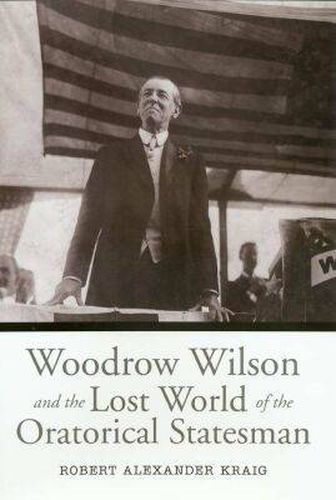Readings Newsletter
Become a Readings Member to make your shopping experience even easier.
Sign in or sign up for free!
You’re not far away from qualifying for FREE standard shipping within Australia
You’ve qualified for FREE standard shipping within Australia
The cart is loading…






I wish there were some great orator who would go about and make men drunk with this spirit of selfsacrifice … whose tongue might every day carry abroad the gold accents of that creative age in which we were born a nation; accents which would ring like tones of reassurance around the whole circle of the globe. These rousing words of academician Woodrow Wilson foreshadowed the role oratory would play in his own political career–a career that saw him triumph on his domestic agenda largely through his inspirational message but fail in his most cherished dream, the League of Nations, when words were not enough.
Robert Kraig’s path-breaking study of Wilson’s political philosophy of the oratorical statesman traces the classical influences on him as a young man, the development of his full-blown scholarly philosophy of oratory, and his use of rhetoric as governor of New Jersey and president of the United States. Although Wilson’s reputation as one of the most eloquent American presidents is firmly established, treatments of his life and presidency have largely ignored how his rhetorical leadership was formed.
Kraig addresses this oversight by examining the rich neoclassical traditions of Anglo-American oratory and statesmanship, the rhetorical pedagogy of the Gilded Age, and the development of Wilson’s own political thought. He concludes with consideration of how Wilson’s conception of oratorical leadership influenced his innovative conduct of the presidency.
The result is a revisionist interpretation of Wilson’s presidency that gives it a clearer historical context, shedding light on a neglected dimension of the political culture of the Progressive Era. In the process, Kraig reopens the question of how effective Wilson’s effort for international cooperation might have been had illness not struck him down.
$9.00 standard shipping within Australia
FREE standard shipping within Australia for orders over $100.00
Express & International shipping calculated at checkout
I wish there were some great orator who would go about and make men drunk with this spirit of selfsacrifice … whose tongue might every day carry abroad the gold accents of that creative age in which we were born a nation; accents which would ring like tones of reassurance around the whole circle of the globe. These rousing words of academician Woodrow Wilson foreshadowed the role oratory would play in his own political career–a career that saw him triumph on his domestic agenda largely through his inspirational message but fail in his most cherished dream, the League of Nations, when words were not enough.
Robert Kraig’s path-breaking study of Wilson’s political philosophy of the oratorical statesman traces the classical influences on him as a young man, the development of his full-blown scholarly philosophy of oratory, and his use of rhetoric as governor of New Jersey and president of the United States. Although Wilson’s reputation as one of the most eloquent American presidents is firmly established, treatments of his life and presidency have largely ignored how his rhetorical leadership was formed.
Kraig addresses this oversight by examining the rich neoclassical traditions of Anglo-American oratory and statesmanship, the rhetorical pedagogy of the Gilded Age, and the development of Wilson’s own political thought. He concludes with consideration of how Wilson’s conception of oratorical leadership influenced his innovative conduct of the presidency.
The result is a revisionist interpretation of Wilson’s presidency that gives it a clearer historical context, shedding light on a neglected dimension of the political culture of the Progressive Era. In the process, Kraig reopens the question of how effective Wilson’s effort for international cooperation might have been had illness not struck him down.